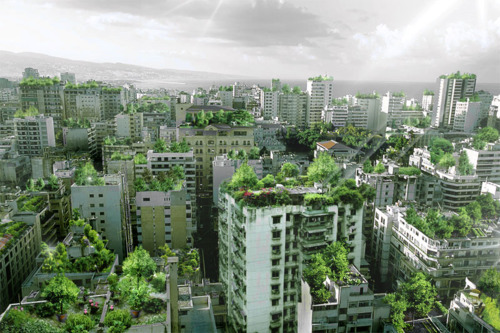Understanding Future Uses of Roofspace and Defining An Early Path to Profitable Roof Estate Investing
November 24th, 2011
Via Green Prophet, an interesting article on what Beirut could look like if a rooftop revolution took hold and scaled outward – a solution, perhaps, to many other high density urban centers as well.
Beirut is almost completely bereft of public green spaces. Satellite images show expanses of grey apartment and office blocks and a depressing lack of trees or any other kind of greenery. But architect and urban designer Wassim Melki has a plan to radically change all of this. Whilst finding space to create public parks, or even planting trees alongside roads is practically impossible, he suggests that the solution lies on rooftops.
“The idea of having a rooftop garden is not something new,” he told Green Prophet, “[but] the approach we took is a little bit different.”
Conjuring images of the legendary Hanging Gardens of Babylon, Melki’s company StudioInvisible propose to apply their project on an enormous scale. They plan to make everyone, “by force, if necessary”, plant a couple of trees on their rooftops, in a way that is “accessible, cheap and easily maintained.”
How green roofs could work in Beirut
Whilst most conventional rooftop gardens encounter many difficulties, such as issues of drainage and insulation, and the danger of rooftop trees being toppled in high winds, planting them in pots seems to be the most effective solution.
This method, combined with the use of steel wires for stability, would be especially appropriate for Beirut as there are numerous trees that could grow in pots in its climate such as the olive tree, the Schinum Molle, Morus Alba, etc. The list goes on.
Aside from the aesthetic benefits, and the improvements to the quality of living the residents of Beirut would enjoy were this initiative to be implemented, oxygen levels would be better, and a small but valuable crop could even be harvested depending on the types of trees planted.
StudioInvisible plans to implement this project by way of a “municipal decree”, mandating all residents to grow a few trees on their roofs, or through some other form of authority. This is necessary, Melki explains, lest the project be doomed to failure, something he laments is “very common” in Lebanon.
The studio suggests offering “tax reductions” or other benefits to those buildings that have well-maintained rooftop gardens. It urges politicians to have the foresight to see the possible political advantages they could glean from implementing this initiative, being able to say that they literally “turned Beirut green”.
The initiative has been circulated on the internet at a rate that StudioInvisible “never expected”, Wassim Melki said, already clocking up over 8000 views between their own website and archileb.com.
But despite this enormously encouraging support, the project faces a number of significant challenges as it now seeks to gain the interest of individuals and groups from different fields, financial support and, at least, “moral support” from the municipality of Beirut and the Ministry of Environment.
The simplicity, feasibility and potential of the initiative make its attractiveness undeniable. As StudioInvisible boldly suggest, if this plan were to work, “Beirut could become a rooftop wonder forest, the whole city as a landmark.”
This entry was posted on Thursday, November 24th, 2011 at 5:41 am and is filed under Uncategorized. You can follow any responses to this entry through the RSS 2.0 feed. You can leave a response, or trackback from your own site.
Leave a Reply
You must be logged in to post a comment.
Educated at Yale University (Bachelor of Arts - History) and Harvard (Master in Public Policy - International Development), Monty Simus has held a lifelong interest in environmental and conservation issues, primarily as they relate to freshwater scarcity, renewable energy, and national park policy. Working from a water-scarce base in Las Vegas with his wife and son, he is the founder of Water Politics, an organization dedicated to the identification and analysis of geopolitical water issues arising from the world’s growing and vast water deficits, and is also a co-founder of SmartMarkets, an eco-preneurial venture that applies web 2.0 technology and online social networking innovations to motivate energy & water conservation. He previously worked for an independent power producer in Central Asia; co-authored an article appearing in the Summer 2010 issue of the Tulane Environmental Law Journal, titled: “The Water Ethic: The Inexorable Birth Of A Certain Alienable Right”; and authored an article appearing in the inaugural issue of Johns Hopkins University's Global Water Magazine in July 2010 titled: “H2Own: The Water Ethic and an Equitable Market for the Exchange of Individual Water Efficiency Credits.”


